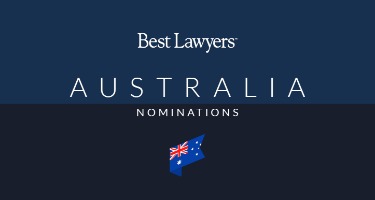The heightened public scrutiny of government agencies and regulatory and integrity bodies throughout Australia of late has made a substantial impact on a number of entities: regulators, the regulated, and anyone who does business with government.
Reports over the last 12 months of investigations into the conduct of regulators and other government agencies have served as a good reminder of the importance of several key matters:
- government agencies exercising the functions given to them under legislation and having regard to the objects of the legislation they administer;
- good record-keeping and the need to have systems in place to respond to oversight bodies accurately and promptly;
- good decision making based on sound risk assessments and expert knowledge; • good supplier diligence and procurement even, and perhaps especially, when there is urgency for the action or procurement; and
- the “Six Principles” of the Honourable Kenneth Hayne AC QC, from the Royal Commission Into Misconduct in the Banking, Superannuation, and Financial Services Industry, namely:
- obey the law;
- do not mislead or deceive;
- be fair;
- provide services that are fit for purpose;
- deliver services with reasonable care and skill; and
- when acting for another, act in the best interests of that party.
Likewise, all entities must accept that external oversight is an inherent component of good governance. We examine this trend through a brief coverage of recent Inquiries in Australia.
Special Commission of Inquiry Into the Ruby Princess
A Royal Commission, or Special Commission, is a form of ad hoc inquiry headed by a commissioner to report on a given matter. Across the states and territories of Australia, similar legislation establishes the framework, and manner of commencement, of these inquiries.
One such commission was assembled to respond to the disembarkation of passengers in Sydney, New South Wales from the cruise ship Ruby Princess on the morning of 19 March, 2020, at the outset of the pandemic. Bret Walker SC was appointed commissioner of the inquiry; he reported his findings on 14 August.
The report, in particular chapter 11, emphasises the importance of information sharing between government agencies (including intrastate agencies) and between state and federal government agencies as well. Other crucial points of the inquiry included:
- the benefit of sufficient documentation of day-to-day administration of legislation, which is particularly important when operations occur under broad powers or agreement;
- the importance of adhering to internal processes;
- the importance of sufficient documentation of decisions by government departments; and
- a reminder that it is not sufficient just to have good processes and systems. The internal structures and procedures of government departments must be complemented by adequate training and be regularly interrogated to ensure that they remain fit for purpose.
Those matters are just as relevant to private-sector bodies with complex systems and procedures as they are to government agencies.
Some of the topics pertinent to the Ruby Princess Inquiry also arose in the Victorian inquiry into the Covid-19 Hotel Quarantine Program.
The Hotel Quarantine Inquiry
By the time passengers disembarked from the Ruby Princess in New South Wales in March 2020, Covid-19 was already wreaking havoc in Victoria. By that May, though, active cases in Victoria had fallen to 57 from a peak of 541 in March. By 1 June, “stage three” restrictions originally imposed in March had eased.
Little more than a month later, however, a second outbreak linked to containment breaches in the state’s hotel-quarantine program descended on Victoria. Hundreds of lives were lost. The Hotel Quarantine Inquiry was established by an Order in Council on 2 July, and in December 2020 the Honourable Jennifer Coate AO delivered her report.
The key highlights of this inquiry concerned the importance of:
- forward-looking risk assessments;
- making decisions at the correct level of authority and expertise;
- adhering to extant policies; and
- transparent and cohesive governance structures.
Regarding the first two points, Commissioner Coate observed, on page 22 of her report, that the process by which security firms were selected was neither appropriate nor sufficiently rigorous, was too hasty, done without any risk assessment, led by staff without the requisite experience or knowledge, and made without any public-health oversight or input.
As in the Ruby Princess Inquiry, too, the Hotel Quarantine Inquiry noted the importance of observing existing policies. For example, although the applicable critical incident procurement policy offered flexibility to source services outside the approved list of suppliers, it did not follow that proper procurement practices and decision making prescribed by the policy could simply be disregarded. In this respect, Commissioner Coate noted that
Procurement policies are there for a reason. The existence of procurement policies in general . . . reflect principles of value of money as well as accountability, suitability, and capability to properly provide services, transparency, and probity.
Her comments reinforce the warnings from NSW’s Independent Commission Against Corruption (ICAC) in the early days of the pandemic, when the commission announced that pandemic conditions were conducive to fraud based on the well-known “fraud triangle”— that is, circumstances of financial pressure, opportunity, and rationalisation.
In the exigent uncertainty of the pandemic, financial pressure might be exerted on public servants, as well as on external suppliers and contractors. New opportunities for corruption might arise due to security weaknesses, departure from usual processes, or lack of staff super vision. Rationalisation of dishonest behaviour may occur when the boundaries of morally justifiable actions appear to shift due to unusual or urgent circumstances, or because others are perceived to be getting away with it.
In the exigent uncertainty of the pandemic, financial pressure might be exerted on public servants, as well as on external suppliers and contractors.”
Finally, the Hotel Quarantine Inquiry showed the critical importance of clarity in oversight arrangements and governance structures—and good communication of both. Without them, any organisation’s response to an emerging threat may be crippled by confusion and fragmentation.
Conclusion
Commissions of Inquiry are not the only form of oversight. Others include permanent bodies such as state-based anticorruption commissions, audit offices, Senate committee hearings, and, with increasing frequency in New South Wales, the use of parliamentary orders for production of documents.
The media, of course, are another important check on the exercise of power. The combination of investigative journalism plus statutory and parliamentary mechanisms for oversight has allowed for close examination of the performance of various law- enforcement bodies over the last 12 months.
The recent upsurge of inquiries into the behaviour of powerful entities—including financial institutions, casinos, and government agencies—signals to regulators and the regulated in every sector, in a highly public manner, the ways in which they will be held accountable.
Michael Sullivan is a partner at Norton Rose Fulbright Australia. Michael is a litigation lawyer with a particular focus on providing litigation and advisory support to government clients. He regularly assists government clients with prosecutions; investigations; statutory inquiries; and administrative law and private sector clients with complex contractual disputes or regulatory proceedings.































